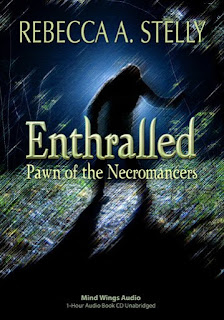When I was a student struggling through school, my favorite subjects were social studies and history. These lessons resembled stories and involved less actual work than reading, math and writing - which I loathed. Yet it was my writing projects that seemed to impress the teacher when nothing else would. I loved letting my mind wander off on all sorts of adventures, but I really hated having to write them down.
It wasn’t until the last question on that final test - the test that would net me a diploma - that I realized how much my attitude towards writing had changed. I was told to, “Write an essay about something you once hated but now love.” That something was writing. I was given thirty minutes to finish and scored higher than most of the others taking the test.
I wrote several practice novels after graduating, all dealing with magic, and often starring creatures that mainstream media dismissed as “sidekicks.” I eventually started a blog, and there found an audience willing to tell me which of my ideas they thought were the best. This improved my work immensely, but I’m most grateful for those friends and family whose efforts make this job easier.
Was there anything in particular that inspired you to write Enthralled?
While visiting New Orleans, I noticed many of the shops along Bourbon Street had second floors that seemed to be used for storage. I wondered what could be hiding up there, behind those darkened windows, left over from a time when things like slavery and prostitution were legal in the city. The zombie slave is a staple of local folklore. I feel it neatly embodies the exploited soul.
I like to find new ways to present old ideas, or in the case of “Enthralled” ,old ways to present new ones. We have taken the vampire (originally a monster) and re-imagined it as a hero. Then we took the zombie ( originally a helpless slave) and re-imagined it as a monster more horrible than any of the rest. This intrigues me. I’d like to give it back to the zombie.
In the past and present century, zombies have been a topic writers have chosen with varying degrees of success. Instead of the pop culture concept such as in “Night of the Living Dead”, the zombie in “Enthralled” is based on the Haitian definition of a zombie as being a corpse who has been reanimated and controlled by magical means. Were the particulars about Sam’s idiosyncrasies based on research findings or your imagination as the author?
Both. I’ve done some research. I’ve read some accounts over the years. The role of salt in my story is based on beliefs as well as accounts of how zombie slaves were supposedly controlled. Sam’s obsession with following orders to the point of self injury is just how I chose to interpret the idea of a creature that literally lives to serve. Grave mites, however, are my own little pets.
What is your preferred genre of writing?
I prefer to work with fantasy, horror, mystery and suspense, as well as with combinations of the three. When dabbling in non-fiction, I prefer subjects that are unusual, and people who challenge the concept of normal. In short, I am far more interested in what a thing could be, than what it simply is.
What do you think makes a good story?
I like a good mystery from an author who isn’t afraid to cast a few spells. Combining mystery and fantasy means anything can happen. Then there is the ending. Ideally, it should be even better than the beginning with a twist or two that leaves me wanting more!
What does audio production bring to your story?
I think it brings portability and convenience to people who would not otherwise have the time. Audio production opens an exciting new door for me, a door I thought was closed to all but musicians. I look forward to having people not just read, but also listen to my stories on their hand held devices.
Do you have other published works or plans to write any novels in the future?
I have a blog - http://rastelly.com/. I post a lot of my material there, from humorous articles about renegade art (Bohemians at Large) to short stories and serials. I am also pretty good with colored pencils; I often use my original artwork to illustrate my articles.
What are you currently working on?
I am currently in the process of publishing a picture book. “To the World Above” is a deep sea adventure about a fish creature who learns to explore the surface world in a vehicle called an Ultra Marine.
Published Works
To the World Above (Picture book - due out in the coming year.)RUST (blog novel)
Burlap Cat (blog serial)
Oscura (blog serial)
Red House (blog serial)
Bohemians at Large (blog humor articles.)











 1. The story Whisper was your third novella since returning to fiction writing. MP3 download listeners are showing great interest in this particular story. To what do you attribute the surge?
1. The story Whisper was your third novella since returning to fiction writing. MP3 download listeners are showing great interest in this particular story. To what do you attribute the surge?


 Victoria S. Johnson enjoys writing short stories, novels and poems, as well as reading them. She takes pleasure in road trips, and seeing the beauty of the country. Victoria also spends time assisting the elderly and handicapped people in her community.
Victoria S. Johnson enjoys writing short stories, novels and poems, as well as reading them. She takes pleasure in road trips, and seeing the beauty of the country. Victoria also spends time assisting the elderly and handicapped people in her community.




























